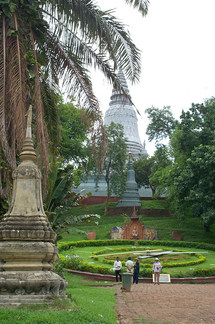
Lefeuvre, a nurse, said her French-educated husband Ouk Ket was asked to return home in 1977 from his job as a diplomat in Senegal, Dakar, to help the reconstruction of Cambodia.
But she said that on arrival Ouk Ket was "kidnapped with his hands tied behind his back, blindfolded, and brought in a truck" and went to "hell" at the jail in the capital Phnom Penh.
Her husband was "tied up like slave to a metal bar, chained up," she said.
Lefeuvre said that in 1991 she and her family came to see Tuol Sleng, which was turned into a genocide museum after the 1979 fall of the Khmer Rouge, and found his name on a list of the dead.
"He died a slow death at S-21 in the most complete secrecy," she said, referring to the prison by its former, official Khmer Rouge name.
"Murderers broke his skull at Choeung Ek (the so-called "killing field" outside Phnom Penh, where inmates were executed) and then cut his throat while throwing him into a pit. This is an absolutely inexcusable murder," she said.
"Ket's suffering was and still is our suffering and it does not go away with time. I can tell you that this suffering is more and more intense," she said.
The 66-year-old Duch, a former maths teacher whose real name is Kaing Guek Eav, has previously accepted responsibility for his role in governing the jail under the 1975-1979 communist regime and begged forgiveness.
But Lefeuvre told the court she was not ready to forgive him.
Led by Pol Pot, who died in 1998, the Khmer Rouge emptied Cambodia's cities in a bid to forge an agrarian utopia, resulting in the deaths of up to two million people from starvation, overwork and torture.
-------------------------------------------------------------------------------------------------------------------------------
But she said that on arrival Ouk Ket was "kidnapped with his hands tied behind his back, blindfolded, and brought in a truck" and went to "hell" at the jail in the capital Phnom Penh.
Her husband was "tied up like slave to a metal bar, chained up," she said.
Lefeuvre said that in 1991 she and her family came to see Tuol Sleng, which was turned into a genocide museum after the 1979 fall of the Khmer Rouge, and found his name on a list of the dead.
"He died a slow death at S-21 in the most complete secrecy," she said, referring to the prison by its former, official Khmer Rouge name.
"Murderers broke his skull at Choeung Ek (the so-called "killing field" outside Phnom Penh, where inmates were executed) and then cut his throat while throwing him into a pit. This is an absolutely inexcusable murder," she said.
"Ket's suffering was and still is our suffering and it does not go away with time. I can tell you that this suffering is more and more intense," she said.
The 66-year-old Duch, a former maths teacher whose real name is Kaing Guek Eav, has previously accepted responsibility for his role in governing the jail under the 1975-1979 communist regime and begged forgiveness.
But Lefeuvre told the court she was not ready to forgive him.
Led by Pol Pot, who died in 1998, the Khmer Rouge emptied Cambodia's cities in a bid to forge an agrarian utopia, resulting in the deaths of up to two million people from starvation, overwork and torture.
-------------------------------------------------------------------------------------------------------------------------------









 Home
Home Politics
Politics









